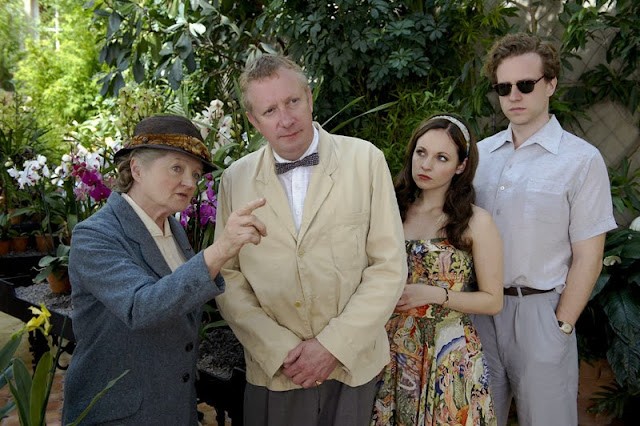The Agatha Christie’s Marple series, particularly the fourth series, has seen its share of adaptations, but the episode based on “Why Didn’t They Ask Evans?” stands out for the wrong reasons. Broadcast in the UK on June 15th, 2011, this adaptation, penned by Patrick Barlow and directed by Nicholas Renton, deviates significantly from Christie’s original novel. While previous adaptations have taken liberties, this particular episode, produced by Karen Thrussell, raises a crucial question: why didn’t they ask if inserting Miss Marple was truly necessary, or even beneficial, to the narrative?
The core issue lies within the plot’s drastic departure from Agatha Christie’s work. Unlike other episodes that, while adapted, remained reasonably faithful to the source material, “Why Didn’t They Ask Evans?” feels almost like a complete rewrite. The original novel thrives on the youthful energy and amateur sleuthing of Bobby Jones and Frankie Derwent. These characters, still present in this adaptation played by Sean Biggerstaff and Georgia Moffat, are overshadowed and frankly, undermined by the insertion of Miss Marple, portrayed by Julia McKenzie.
This leads to the central problem: Miss Marple’s presence feels forced and unnatural. In the novel, the charm is in watching young, relatively inexperienced individuals navigate a complex mystery. Why didn’t they ask themselves if introducing a seasoned detective like Miss Marple would dilute this core appeal? Marple doesn’t organically fit into the dynamic; she essentially takes over the investigation, solving the puzzle while Bobby and Frankie become secondary figures in their own story. It begs the question of why these young amateur sleuths would willingly involve, let alone rely on, an elderly lady known for her nosiness, however astute she may be.
Furthermore, the plot alterations extend beyond simply adding Miss Marple. A significant subplot involving China is introduced, fundamentally altering the murderer’s motivations. Characters are reimagined – Sylvia Bassington-ffrench becomes Sylvia Savage, married to Jack Savage instead of John, and burdened with children Tom and Dorothy. The introduction of a character named Evans, who is promptly killed off, adds another layer of unnecessary complexity. Many characters from the novel are either completely rewritten or omitted entirely, leading to a narrative that barely resembles its source. Even the crucial cliffside murder, a pivotal element of the original “Why Didn’t They Ask Evans?” story, is depicted with vital clues missing, further weakening the adaptation’s connection to Christie’s plot.
The feeling is that the adaptation discarded the source material and built something almost entirely new around a recognizable title. While Patrick Barlow might have crafted a passable standalone drama, branding it as an Agatha Christie’s Marple adaptation feels misleading and ultimately detrimental to the spirit of the original work. It’s a disservice to both fans of Miss Marple who expect intelligent adaptations and enthusiasts of “Why Didn’t They Ask Evans?” who appreciate the unique charm of its amateur detectives. This adaptation unfortunately echoes the sentiment of being the “Appointment With Death” of the Marple series, a low point in an otherwise generally well-received run.
Despite the significant plot issues, certain aspects of the production deserve recognition. Nicholas Renton’s direction establishes a fittingly dark and obscure tone, reflecting the secrets and hidden agendas within the story. The choice of Loseley Park near Guildford as Castle Savage provides a suitably gloomy and imposing backdrop. Richard Hammerton’s soundtrack effectively enhances the atmosphere, with tracks like “China” and “The Will” adding depth to the narrative, even if the narrative itself is flawed.
Julia McKenzie, as always, delivers a captivating performance as Miss Marple, bringing her signature charm and intelligence to the role. Samantha Bond stands out within the guest cast, offering a compelling portrayal of the weakened Sylvia Savage. Richard Briers also provides a noteworthy performance as the butler Wilson, adding a layer of shifty loyalty to the ensemble. However, even strong performances cannot salvage a plot that strays so far from its source and fundamentally misunderstands the spirit of “Why Didn’t They Ask Evans?”.
In conclusion, while the production values and acting are commendable, the adaptation of “Why Didn’t They Ask Evans?” ultimately falters due to its unnecessary deviations from Agatha Christie’s novel, most notably the insertion of Miss Marple. The fundamental question remains: why didn’t they ask if these changes would truly improve the story, or if they would instead dilute the very essence of what made the original novel so engaging? The result is an episode that, while watchable as a standalone drama, fails to capture the spirit of Agatha Christie and leaves fans questioning the creative choices made.
